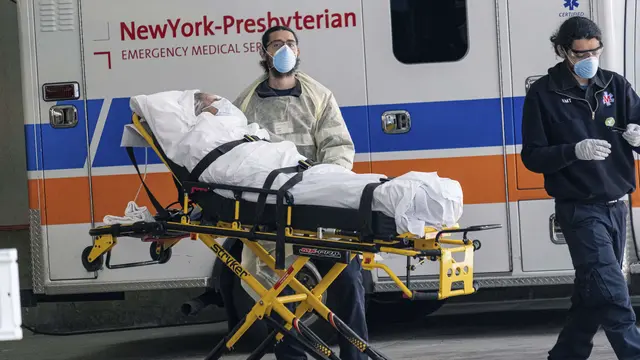03:22

**Editor's Note: **Tackling the global COVID-19 pandemic requires concerted efforts from countries around the world. How should we evaluate the performances of various governments so far? What is the cost of China-blaming, voter-pleasing? And what lies ahead as COVID-19 figures start to rise in developing countries? Prominent British scholar and columnist Martin Jacques spoke to CGTN in an exclusive TV interview on World Insight with Tian Wei. (Revisions were made to fit the transcript format.)
**Tian Wei: **How do you see the responsibilities the government has shouldered so far during this stage of COVID-19? Are they disappointing? Should we be optimistic?
Martin Jacques: I think the word you used, disappointing, is the most accurate one. Let's look at what the reaction in the West was. The reaction in the West during the course of January was basically to say to China that you're covering up; it's all about secrecy; you're not being honest with us; you're not being honest with your own people; the Chinese government is only interested in its own survival; it's not interested in Chinese lives, and all this kind of thing. It really was an aggressive anti-China assault in January. We mustn't forget or misunderstand that it was like that.
The result of this was that the people and the governing classes in the West didn't think the coronavirus could reach them and affect them. They thought it was a Chinese problem. They had two months to prepare and they learned nothing.
The one great exception in the West in my view is Germany, which seems to have done an excellent job. Germany really thought about the problem and clearly learned from East Asia by doing testing and so on.
What this tells me is that the difficulty, the whole response to the pandemic, has been colored by the political differences of our attitudes towards China in the West, which have seriously weakened the Western response. They didn't learn because they thought they would never be affected.
This was hubris. This was arrogance on the part of the West, and we in the West and countries are paying a big price for this.
I'd like to make one exemption to this: I don't hear the scientists in the UK criticizing China. Instead, you hear them saying that they're abreast of a lot of the Chinese medical literature on COVID-19. They seek to learn from evidences provided by China. This is the kind of relationship that should be between countries and between media and between national governments.
**Tian: **How confident are you about the next step?
Jacques: To be honest I'm not so confident. It looks like Europe is just beginning to turn the corner, but we should not be too optimistic about that. In the UK, the situation is very serious. We probably have the highest in Europe, but they don't count for everything that they should be counting, so the figure is somewhat glossed over. So we've got a long way to go here in Europe.
In terms of America, where number of deaths is the worst in the world, there's a huge problem with the polarization of American politics, which means there has not been a proper concerted action. New York seems to have been handled well by Andrew Cuomo, but of course Donald Trump is always pulling in another direction, speaking to a different audience. It's the audience he thinks is going to elect him in the president election in November.
There's also the absolutely critical question of what is going to happen to the developing countries. That could be a big problem because then you can easily have a kickback effect of the virus going from developing countries back into the relatively rich countries. We don't know where the end is and the story of the pandemic is not finished.
**Tian: **As you said, this is a global pandemic and the virus will exploit the cracks wherever they exist. You mentioned problems with the U.S. leadership. So is the world paying a heavy price for the election that is coming up in the U.S.?
Jacques: I think that Trump is really only interested in one thing, and that is his re-election. Trump shows you how dangerous it is to have the leader of the U.S. simply playing to a section of the American population, with which he has some kind of affinity, some kind of resonance. The interests and prejudices of this one section of the American population is placed above those of the rest of the U.S., which is at least half the country, and above the rest of the world. So that's the situation. That's the dilemma: the world is faced with someone like Trump being the president of the U.S.
**Tian: **But Mr. Jaqcues, we have mostly heard silence from European capitals since the U.S. announced halting of funding for the World Health Organization.
Jacques: While I have not seen all the responses from different European governments, the responses I have seen are very critical of the U.S. In fact not just critical, they are opposed to the U.S. action. They think it's absolutely the wrong thing to do. In my own country, the UK, even the conservative party, which can lean toward Trump's direction, is very much against what Trump has done. So Trump is pretty isolated in the world.
**Tian: **You have been a keen observer of the differences in governance styles between the East and the West. What have you seen so far in the context of this COVID-19 pandemic?
Jacques: I've seen very marked differences. East Asia, by which I mean China, Vietnam, the Republic of Korea, Hong Kong, Singapore, and so on, they've all handled the virus pretty successfully. And we have always got to remember that China was confronted with an unknown virus and had to figure everything out by itself, it couldn't look to elsewhere for experience.
Now why is that? I think it's not just a political question but a cultural one as well. That's got to do with this strong relationship in Confucian style societies between the state and the individual. The individuals in these countries expect governments to give a lead, to take the initiative, and people will respond in a very orderly way.
In Europe and the U.S., I think it's much less like that. It varies across the different countries; they're not all the same. But the tendency is that this kind of relationship between state and individual is much more distant. Not only the individuals react in a different way than those in East Asia, but the states in the West are also disinclined to intervene. Looking at my own country, the UK, the lockdown was adopted very very slowly by the government. It was reluctant. Given the urgency, it moved at a snail's pace.
So you can see that the East Asian countries I mentioned before were able to deal with an epidemic like this much more efficiently, and the death figures show that difference.
Now the other extreme case on the Western side is the U.S., where the attitude towards government is to keep it at arm's length. The popular opinion is that the state is a problem and even an enemy. So that makes getting an effective action much more difficult. And that is complicated by two other factors. One is the federal system. So there's the states on the one hand and the national government on the other. And the other problem is the deep polarization now in American politics, which really in some degree or another paralyzes or greatly undermines the capacity to do things.
Also I think we are still only in the early stage of this pandemic. Remember that most people are living in the developing world. Those figures we've got at the moment, about COVID-19 in places such as India and Sub-Saharan Africa and so on, I fear to say are maybe only the first phase of what we are going to see. I think it is going to become very very serious.
World Insight with Tian Wei is an international debate/in-depth interview program facilitated by host Tian Wei. People in the know, be they global leaders or emerging change-makers, all provide their insights on this unique global platform.
Schedule: Monday-Saturday
Time (GMT): 1415, 2015
(If you want to contribute and have specific expertise, please contact us [email protected].)
 简体中文
简体中文





